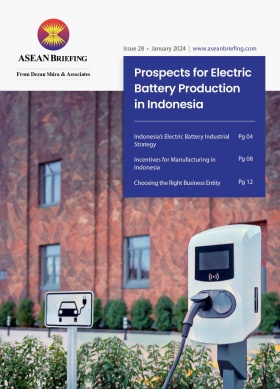Key Tax Changes for Foreign Firms in Vietnam
Changes to several taxes in Vietnam have taken effect in 2024. Some of these changes have been made to provide economic stimulus, whereas others have been made to bring Vietnam’s tax policies in line with changes into broader, international tax regimes.
There are the key changes that have taken place this week that foreign firms should be aware of.
Top-up tax goes into effect
Vietnam’s National Assembly passed a top-up tax in response to the Organization for Economic Cooperation and Development (OECD) Global Minimum Tax (GMT) initiative back in November. This will see companies currently paying less than 15 percent tax required to pay a top-up tax covering the difference from the start of next year.
For some time, Vietnam has offered foreign investors very generous tax breaks to encourage them to open factories and plants around the country. This, in turn, has helped Vietnam cement its place as an important block in global supply chains and a major global manufacturing hub.
Per Resolution 107/2023/QH15, from January 1, 2024, firms must ensure they comply with Vietnam’s top-up tax requirements.
Environmental Protection Tax cut extended
On the books since 2010, Vietnam’s Environmental Protection Tax (EPT) has been a key pillar of Vietnam’s transition to a cleaner, greener economy.
In April of 2023, in response to several challenges, the EPT on fuels and lubricants was cut in an attempt to stimulate the economy. This cut has now been extended to the end of 2024 by Resolution 42/2023/UBTVQH15. It has been estimated that this EPT cut will decrease tax revenue by about VND 42,822 billion (US$1.76 billion).
EPT tax rate, fuels, and lubricants, to December 31, 2024.
|
Description |
Unit |
Tax per unit (VND) |
|
Gasoline, except ethanol |
liter |
2,000 |
|
Jet fuel |
liter |
1,000 |
|
Diesel oil |
liter |
1,000 |
|
Fuel |
liter |
600 |
|
Fuel oil |
liter |
1,000 |
|
Lubricant |
liter |
1,000 |
|
Grease |
kilogram |
1,000 |
VAT tax reduced to 8 percent
Normally levied at 10 percent, Vietnam VAT was reduced to 8 percent from July 1, 2023, for the last half of this year – a reduction that has now been extended to June 30, 2024, per Decree 94/2023/ND-CP.
The cut will apply to most sectors except for telecommunications, information technology, finance, banking, securities, insurance, real estate, metals and metal products, mining, refined petroleum, chemicals, and items subject to excise tax.
In February of 2022, under a similar policy, the Vietnamese government cut the VAT from 10 to 8 percent to boost the pandemic-hit local economy. The cut, which was in place until the end of December 2022, cost Vietnam’s state budget an estimated VND 49.4 trillion (US$2.2 billion) in revenue.
This latest iteration of the VAT reduction is expected to follow the same basic guiding principles as previous VAT reductions.
Car registration fee cut ends
In July of 2023, a cut to vehicle registration fees was introduced to try and stimulate the local car manufacturing industry. This was detailed in Decree 41/2023/ND-CP and effectively halved registration costs for cars, trailers, and semi-trailers assembled in Vietnam.
As of January 1, 2024 this fee reduction has been removed and vehicle owners are once again required to pay the full registration fee. This is outlined in Decree 10/2022/ND-CP.
About Us
ASEAN Briefing is produced by Dezan Shira & Associates. The firm assists foreign investors throughout Asia and maintains offices throughout ASEAN, including in Singapore, Hanoi, Ho Chi Minh City, and Da Nang in Vietnam, in addition to Jakarta, in Indonesia. We also have partner firms in Malaysia, the Philippines, and Thailand as well as our practices in China and India. Please contact us at asean@dezshira.com or visit our website at www.dezshira.com.







